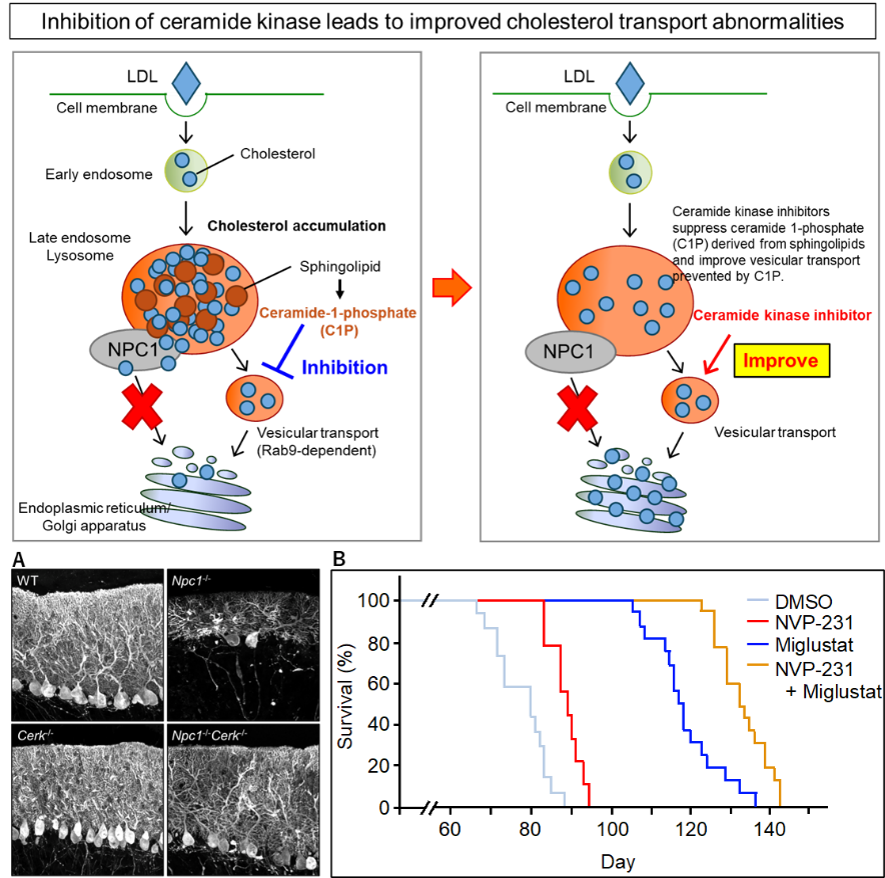Advantage and Core Benefit
- New Mechanism of Action: C1P synthesis inhibitors improve intracellular cholesterol transport abnormalities, offering a novel treatment option for lipid transport disorders where conventional therapies have been ineffective.
- Expanded Treatment Options: Potential for combination therapy with Miglustat, the existing treatment for Niemann-Pick Disease Type C (NPC), or dose reduction to mitigate side effects.
- Broad Applicability: Expected to be effective not only for NPC but also for other lysosomal storage diseases and disorders associated with intracellular lipid transport abnormalities.
Background and Technology
Niemann-Pick Disease Type C (NPC) is a rare genetic disorder characterized by intracellular lipid transport defects, leading to cholesterol and sphingolipid accumulation. This causes neurological and psychiatric symptoms. Currently, Miglustat, which acts on the glucosylceramide biosynthesis pathway, is the only approved treatment. However, Miglustat does not effectively address cholesterol accumulation in lysosomes and has significant side effects.
The inventors discovered that ceramide-1-phosphate (C1P) levels are elevated in cells derived from NPC patients. They identified that NVP-231, a ceramide kinase inhibitor that acts on C1P biosynthesis, improves lipid transport dysfunction, particularly cholesterol trafficking. Unlike existing NPC therapies, this approach directly addresses intracellular lipid transport abnormalities, offering a potential fundamental treatment for NPC. Additionally, ceramide kinase knockout in mice does not impact survival, suggesting a high safety profile as a therapeutic target. Since many lysosomal storage diseases exhibit lipid transport abnormalities, this therapeutic strategy may be applicable to a broader range of conditions.
Data
- Treatment of NPC cells with NVP-231 (a ceramide kinase inhibitor) improved vesicular transport from late endosomes to the Golgi apparatus, reducing free cholesterol accumulation.
- In NPC/Cerk double knockout (DKO) mice, ceramide kinase (Cerk) deficiency resulted in reduced neurodegeneration (A) and extended survival.
- Administration of NVP-231 to NPC model mice significantly prolonged survival. The effect was further enhanced when combined with Miglustat (B).
 |
Patent & Publication
Patent No. 698485
Researcher
Dr. Hiroyuki Nakamura (Chiba University)
Current Stage
- Identified hit compounds through screening of ceramide kinase inhibitors.
- Optimized derivatives with higher potency have been developed.
Future Research Plans
- Further structural optimization of derivatives
- Efficacy and pharmacology studies using NPC model mice
- Pharmacokinetics and safety evaluation of ceramide kinase inhibitors
Expectations
We are seeking pharmaceutical or biotech companies interested in advancing the clinical development of compounds discovered at Chiba University. Meetings with researchers can be arranged to discuss potential partnership opportunities.
Project ID: WL-05199


